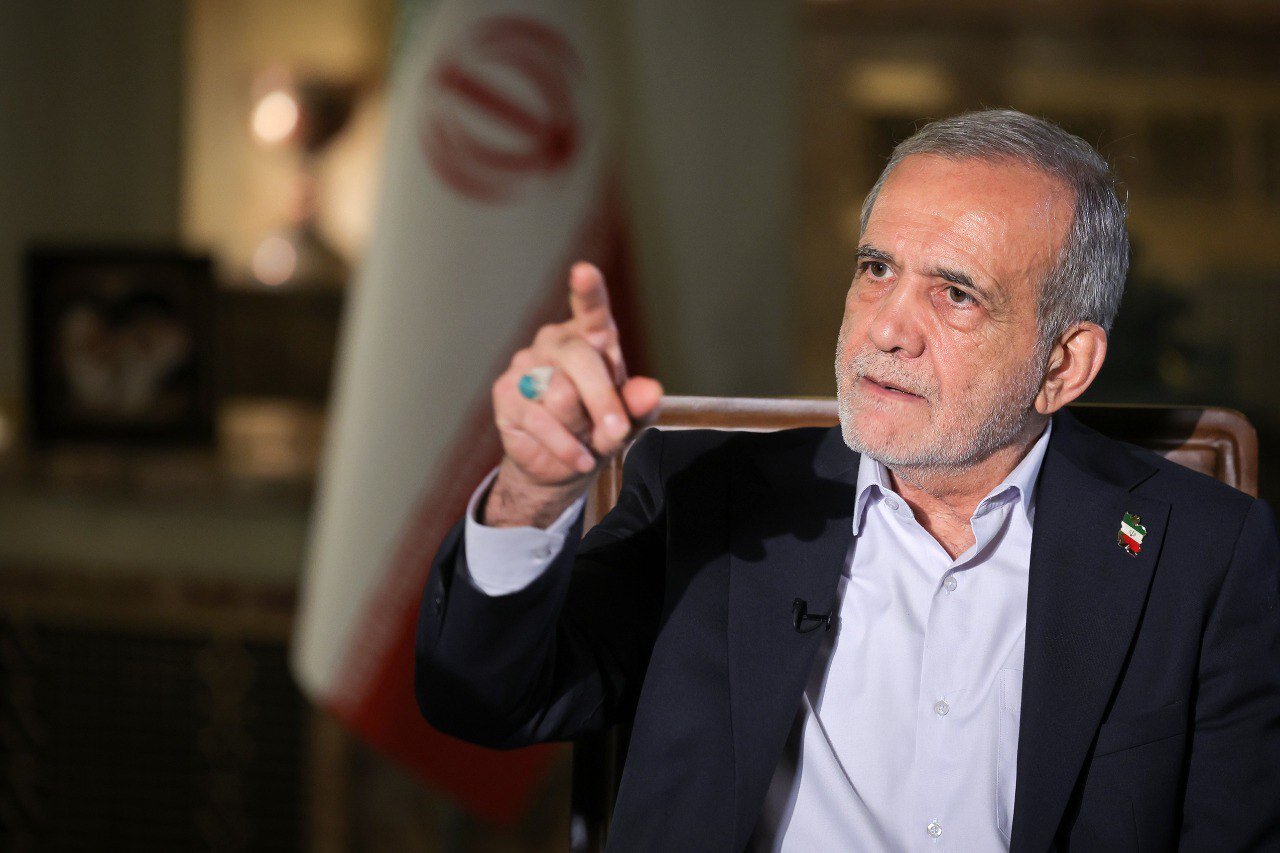Iran won’t forgo legal right to enrichment: Pezeshkian

TEHRAN – President Masoud Pezeshkian says uranium enrichment will continue on Iranian soil in full compliance with international law, reaffirming Tehran’s principled opposition to nuclear weapons on religious, strategic, and humanitarian grounds.
In an interview with Al Jazeera aired on Wednesday, Pezeshkian said: “This is a fundamental and permanent position. Uranium enrichment will proceed on Iranian territory in line with international regulations.”
He underscored that Iran’s stance is not a response to Western pressure but is grounded in its own values and legal commitments.
“We do not accept threats or ultimatums. Donald Trump says Iran must not have a nuclear weapon, and we agree—but not because of his words. We act based on the fatwa of the Leader of the Islamic Revolution, which prohibits such weapons.”
He dismissed as “a delusion” any claims that Iran’s nuclear program has been dismantled, adding that the true power of the program lies in the knowledge and expertise of Iranian scientists, not physical infrastructure.
President Pezeshkian’s remarks were echoed by Foreign Minister Abbas Araghchi, who told Fox News on Monday that Iran will not give up its nuclear program—especially uranium enrichment—even after recent military attacks by the United States and Israel.
“It is clear Iran will not give up enrichment because it is an achievement of our own scientists and a source of national pride,” Araghchi said.
When asked if any enriched uranium was preserved following U.S. strikes, Araghchi said he had “no detailed information,” but noted that the Atomic Energy Organization of Iran was “trying to evaluate what has exactly happened to our nuclear material, to our enriched material.”
On June 13, Israel launched a surprise and unprovoked military assault on Iran, assassinating several senior military commanders, nuclear scientists, and civilians. More than a week later, the United States escalated the conflict by targeting three Iranian nuclear facilities—an act Tehran has censured as a grave breach of the UN Charter, international law, and the Nuclear Non-Proliferation Treaty (NPT).
In response, Iran’s Armed Forces launched hundreds of ballistic missiles and drones against strategic Israeli positions, as well as targeting the U.S. Al-Udeid Air Base in Qatar—the largest American base in West Asia.
In his interview with Al Jazeera, Pezeshkian clarified that Iran had no quarrel with Qatar as a nation, explaining: “We did not attack the country of Qatar—we hit an American base that bombed Iranian territory. Qatar is our sister nation. I even spoke directly with the Emir of Qatar to explain our position. Our intentions toward Qatar are entirely positive and brotherly.”
On June 24, after nearly two weeks of sustained retaliatory operations, Iran succeeded in halting the coordinated Israeli-American military assault.
Prior to the June 13 attacks, Iran and the United States had held five rounds of indirect negotiations regarding Tehran’s peaceful nuclear program. These talks, mediated by Oman, were set to continue in Muscat on June 15—but the planned sixth round was canceled following the Israeli assault.
The Iranian side has expressed concern that the war was deliberately timed to derail diplomatic progress.
Pezeshkian accused the Israeli regime of attempting to dismantle the Islamic Republic through sabotage, targeted assassinations, and chaos, but said these efforts had backfired:
“There’s no doubt that infiltration occurred, but the decisive factor was U.S. technology and how it was exploited. Israel tried to eliminate Iran through chaos, but it was defeated.”
He emphasized that Iran does not seek conflict but cannot afford to rely on the assumption that a ceasefire will hold:
“We will defend ourselves with full strength. Israel conceals its losses from our missile strikes, but its call for a ceasefire speaks volumes.”
The president also confirmed that a recent attempt on his life was part of Israel’s broader assassination campaign targeting Iran’s leadership:
“The attack on me is a continuation of Israel’s strategy of targeting political figures, following its campaign against military commanders.”
Despite accusations by certain Western politicians and media outlets, Iranian officials have consistently reiterated that the Islamic Republic has no intention of developing nuclear weapons.
In Israel's unprovoked and illegal war on Iran that lasted for 12 days, at least 1,060 Iranians, including women and children, were killed.
Leave a Comment